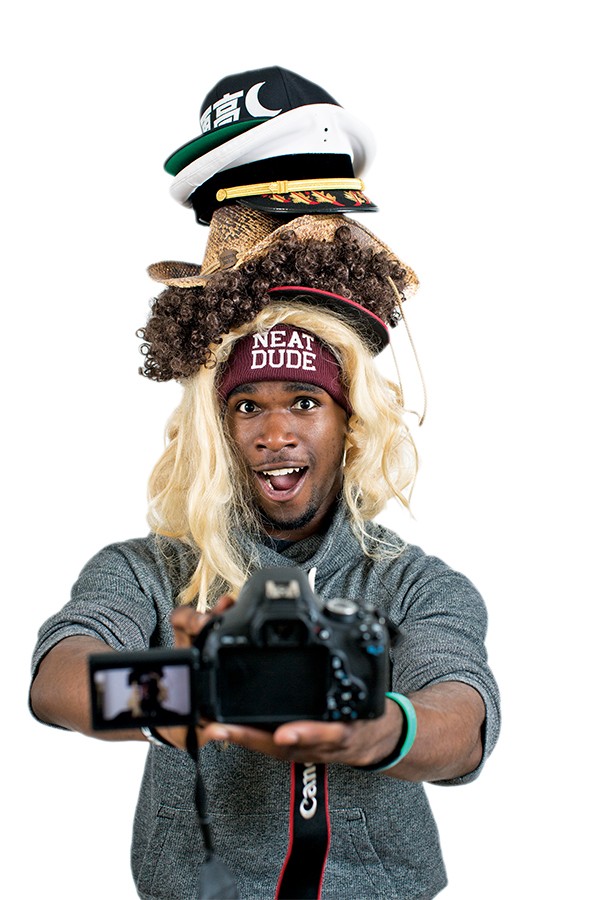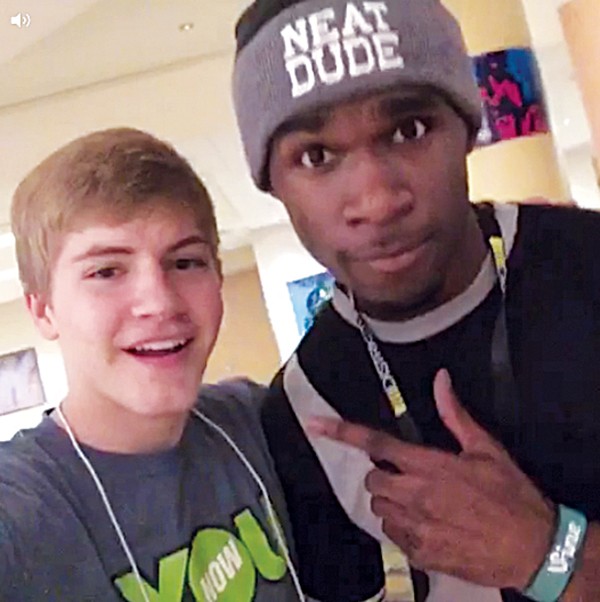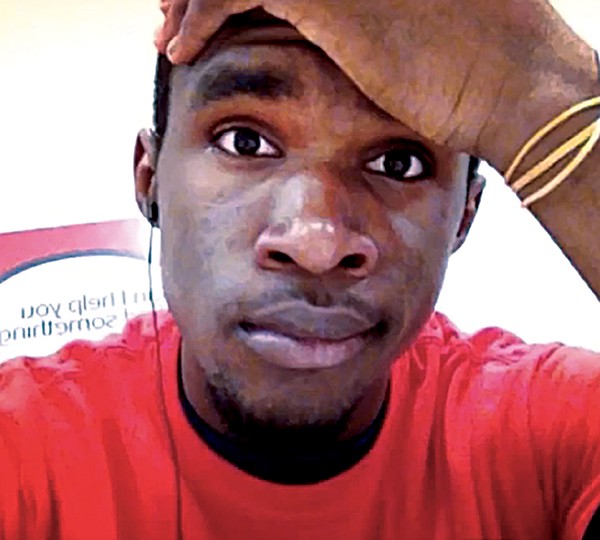The 21-year-old sitting across a Café Eclectic booth laughs softly and speaks with tenacity. He could talk about videos all day, he says, and soon, he might. He’s moving to Los Angeles later this month, going the way of many popular YouTubers and internet content creators who seem to find their way to the Pacific Coast.
Darius Benson, at first glance, wouldn’t strike you as an internet celebrity.
The social media sensation is well-dressed and taller than expected, even though his profile states clearly that he’s 6’4″. Before meeting, he offers any time in the afternoon. He doesn’t wake up before 11 a.m. Lucky him. He sometimes laughs nervously, but when we start talking about Vine, and what he hopes to do professionally, he becomes more confident and collected. He knows what he’s talking about — he’s been here before. He’s talked about Vine a million times.

To his nearly 2.4 million followers on the social media app, Vine, Benson is better known as MrLegenDarius, a comedian who specializes in what he calls “silly, short skits.” Vine is the Twitter version of YouTube, where users can post six-second videos that automatically loop called Vines. Others can then “revine,” or repost, the video to their own followers. Each video also notes the number of loops of the Vine — and it’s not uncommon to see Benson’s videos looped in the millions. (In total, he has more than a billion loops across his videos.)
“For a while, basically all I could watch was Vines,” Benson says. “If I tried to watch a YouTube video that was three [or] four minutes, I’d be like, ‘I just don’t have the time.'”
Vine’s platform has forced the creative hand of content creators, squeezing out every millisecond of video. Some users post impromptu rants in the car. Others have elaborate short films utilizing special effects. Artists have also taken to the medium as a new form of expression for their art, particularly stop-motion artists. More recently, corporations have taken to getting content creators like Benson to advertise for them, using the style they’re known for to push products or create ads.

Some attribute the success of platforms such as Vine to the digital generation’s shrinking attention span. One frequent statistic often thrown out, particularly in the case of Vine, is that the average American attention span has decreased since 2000 — when it sat at 12 seconds — to a measly 8.25 seconds (less than that of a goldfish).
Though that number has been shared on Facebook, printed in books, and published in news articles, research into the specific report quoted found no such study. One published in 2008 by the University of Hamburg detailed internet usage by 25 participants that showed that 52 percent of all website visits by their participants was shorter than 10 seconds.
Ten seconds is where the founders of Vine worked backward from. From the inception of the platform, founders experimented with various lengths of video to see what felt right. While five seconds felt too short and six seconds felt like something was missing, the looping feature added another dimension.
Vine launched in January 2013, six months before Instagram’s 15-second video feature was introduced. Shortly thereafter, Benson, an engineering major, started posting Vines during his spring semester at the University of Memphis. That summer, while working at Target, he posted even more often. His videos were, and are, often spur-of-the-moment, finding inspiration in the smallest things, hanging out with friends, or sitting alone in his bedroom.
His first Vine, titled “got jokes,” featured a talking head version of Benson.

Darius Benson posts videos to Vine regularly, ranging from skits to messages to followers. Benson’s 6-second videos have turned him into an internet celebrity.
“How do trees get on the internet?” he asks in the video. “Wait for it, wait for it. It’s good. They log on. You feel me?”

Now his comedic videos range in style — parodies of viral content, Vine-focused memes, or just a made-up skit, with Benson playing all the parts. He gained popularity when he released a parody series called “Hip Hop Disney,” where Benson covered popular hip-hop songs as if they were performed by Disney characters. The first video in that series — now more than 26 parts — went viral.

“It got 300,000 likes,” Benson says. “It was on the top of the ‘popular Vines’ page all day. That was my breakout moment, like, ‘Wow, I really made something.'”
It wasn’t just that series. The first time Benson was featured in a WorldStarHipHop Vine compilation, people also started to take notice. The website’s compilations (sometimes shortened to “comps”) garner millions of views each week. Nowadays, he isn’t as surprised when his videos make it onto weekly or monthly compilations of popular Vines. He says if he gets around 150,000 likes on a video, he will usually see that video on a compilation.
Benson is driven and focused on content-creating as a business opportunity. Since he blew up, he’s landed sponsorships from Pringles, Microsoft, and even joined other popular Vine stars in promoting the movie Unfriended, a horror film with an aggressive social media marketing team, centering on a group of teens in a video chat together.
He’s able to get these promotional gigs through a liaison company that manages offers from marketing teams, middle-men between online content creators and brands. Benson is able to take creative control over his content, so his sponsored posts aren’t just blanket ads for brands; they’re still what fans of MrLegenDarius can expect.
Benson has also had opportunities to interact with his followers at Playlist Live conventions in Orlando, Florida, and Washington, D.C., dedicated to online content creators and their fans. Vine meetups with other content creators in New York City — where he invited followers to come meet him — drew crowds. He had half-a-million followers.
“For the first time, I saw that many people showing up just for Vine,” he says, holding up his smartphone. “It’s really cool to see the power of [this]. Everything on Vine came from my phone.”

If Benson is in a place where Vine’s demographic — 18 to 20 years old, 57 percent female — hangs out, he’s likely to be recognized. One of his most popular videos, featuring him acting as James Doakes from TV’s Dexter, often gets one of his lines thrown at him in public.
For the most part, Benson keeps his comedy clean, hoping he’ll be able to continue to reach a wider audience and be able to show his conservative parents.
“I also think there’s more respect for comedy that’s generally clean,” he says. “It helps you with opportunities. Like if Pringles wants a promo, they’re going to choose somebody whose content is [cleaner], not someone who’s cussing all the time.”
Homeschooled until he was 14, Benson says he’s used to “making his own fun.” As a child, he says learning skills like juggling was like a “really long training program” for Vine.
His parents, he says, aren’t “that psyched” about having an internet celeb in the family.
“My parents are just like, ‘Eh, that’s funny,'” he says. “But when I was talking about not going to school anymore, they were kind of worried about me.”
Benson’s father, Alvin Benson, the director of the Shelby County Fire Department, told him he needed to have a backup plan. His father was the driving force behind Benson attending the University of Memphis for engineering, something he wasn’t very passionate about. Eventually, he decided to drop out and pursue content creating full-time.
“I’ve always been stubborn,” he says. “When I decide I’m going to do something, I’m going to do it. They saw that decision and they were like, ‘I don’t know. College is a thing you gotta knock out.'”
His parents want to know who he’s talking to in the entertainment industry and check in from time to time, making sure Benson’s not being taken advantage of or making unwise choices. Despite their concerns, both parents are proud. Alvin is actually in one of his son’s Vines, celebrating his two million followers.
“Oh, that’s cool. Check out those pictures over there,” he says in the video, pointing to a wall of photos, posing with Bill Clinton, President Barack Obama, and the Dalai Lama, among other famous figures.
That Vine received more than 330,000 likes and looped more than 13 million times.
“A couple of months before I posted that, he kind of hinted like, ‘Maybe I could get on a video sometime,'” he says. “Before, he was like, ‘Yeah, I don’t know about that Vine thing,’ but now he’s kind of warmed up to it after I started gaining followers and getting opportunities.”
Benson is now looking to diversify into YouTube. He says many YouTubers who have tried to transition into Vine end up having a harder time transferring due to the time constraints.
“They’re used to slowing things down,” Benson says. “One thing that I like about transitioning to YouTube from Vine is that I still have that quick, get-to-the-point mentality when it comes to my videos. I think that helps me a lot.”
When it comes to YouTube, the opportunities aren’t just based on promotional material that Benson has to create on his own. He can make money through actual views, something he’s good at getting. And with consistent viewership, he can end up with a viable, reliable source of income.
Benson’s also seeking a challenge. He’s done well on Vine, but on YouTube, he feels longer video options will allow his creativity to flourish. He’ll be able to not only expand upon ideas he’s initially released on Vine, but also create all-original content with more structure — such as guides to teaching white people to dance and more elaborate skits.
“[YouTube] is where things are happening,” Benson says. “I mean, eventually, I could make my own movie. There’s a lot of steps to that, it takes more experience, but that’s kind of what I’m looking toward.”
For most of us, going from posting funny videos in your spare time to making a living at it and moving to Los Angeles seems like a big leap. But it was a change that Benson fell into naturally: uploading Vines for fun, turning that into a hobby, then, eventually, figuring out how to make it his job.
“It takes a little bit of the fun out of it when you have to do it,” he says. “But I think I’ve done a pretty good job in balancing the two. It’s like work and play combined. That’s why I’m moving to Los Angeles — to try and branch out, so I have a good following across multiple platforms.”
Benson’s been to L.A. six times over the past year, and in L.A., they take Vine seriously. Collaborators meet up — six or seven people, Benson says — and just knock out videos, making multiple videos at a time to publish throughout the week. Benson prefers his spontaneous, natural style, but he says hanging out with other content creators breeds friendships, a bond within a lifestyle that is focused on creating entertainment.
“We’re all kind of weird,” Benson says. “Vines are a weird thing to have in common with somebody. A person who doesn’t make Vines, they can’t understand.”